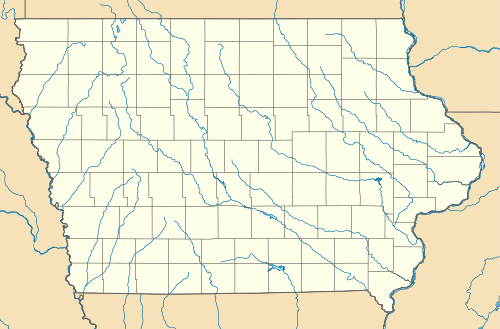Lorenzo S. Coffin Burial Plot
|
Lorenzo S. Coffin Burial Plot | |
|
| |
  | |
| Location | Northwest of Fort Dodge on Iowa Highway 7 |
|---|---|
| Coordinates | 42°31′40″N 94°14′26″W / 42.52778°N 94.24056°WCoordinates: 42°31′40″N 94°14′26″W / 42.52778°N 94.24056°W |
| Area | less than one acre |
| NRHP Reference # | 77000566[1] |
| Added to NRHP | November 17, 1977 |
The Lorenzo S. Coffin Burial Plot is a historic structure located northwest of Fort Dodge, Iowa, United States. Initially the various members of the Coffin family had individual grave markers, but after Lorenzo Coffin's death they were incorporated into a concrete wall.[2] The surrounding graves are those of non-family members. The Coffin family home was originally to the west of the grave site. It was listed on the National Register of Historic Places in 1977.[1]
Lorenzo S. Coffin
Coffin was a New Hampshire native who studied at Oberlin College. He started teaching in Chester, Ohio where future U.S. president James Garfield was one of his students.[2] Coffin moved to Webster County, Iowa in 1854 where he engaged in farming and social reform causes. He was credited with building the first round barn in Iowa.[3] Coffin was an early farm editor in Iowa and served on a variety of boards and associations including the Iowa State Fair, Iowa Stock Breeders Association, Iowa Farmers' Alliance, Farmers Protective Association, and the National Dairy and Food Association. He was also a leader in establishing farmers mutual insurance companies, and agricultural extension education.
Coffin served as Iowa's immigration agent, and as the state's Railroad Commissioner. He was an advocate for railroad safety and established the Railroadmen's Temperance Movement, was involved with the Railroadmen's YMCA movement, helped establish the Railroadmen's Retirement Home in Highland Park, Illinois, and served as president of their board of directors. He supported Prohibition in the United States, served on the Iowa Anti-Saloon League, ran as a Prohibitionist for governor in 1906 and was the vice-presidential candidate on the United Christian Party ticket in 1908.[2] Coffin was also involved with the prison reform movement, and established a home for unwed mothers under the auspices of the Woman's Christian Temperance Union.
References
- 1 2 National Park Service (2009-03-13). "National Register Information System". National Register of Historic Places. National Park Service.
- 1 2 3 Roger Natte. "Lorenzo S. Coffin Burial Plot" (PDF). National Park Service. Retrieved 2016-10-25. with photos
- ↑ "Roberts Octagon Barn" (PDF). National Park Service. Retrieved 2016-10-25.
